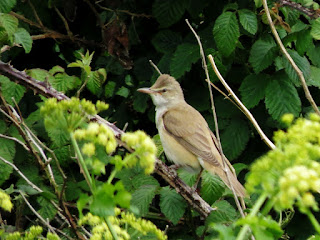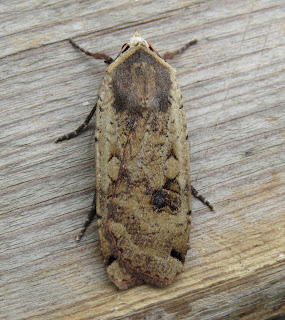Recent Ringing Recoveries
Goldcrest ringed Brabant, Belgium 18th October 2015 retrapped Landguard 238km away 31st March 2016. Blackcap ringed Landguard 19th September 2016 retrapped 155km away Jonkershove, Belgium 24th September 2016.
Saturday 13th May 2017
Cream-spot Tiger is always worth photographing
Mompha subbistrigella is a good example of a species easier to identify after having its picture taken and "blown up."
A slight increase of Wheatear this morning with 6 seen on the reserve and Spotted Flycatcher continue to move through with 2 more individuals today, 1 Whinchat was very mobile throughout the morning. Other migrants noted on the reserve, 2 Yellow Wagtail, 1 Garden Warbler, 1 Continental type Song Thrush.
Passage over the reserve going South, 68 Swallow, 4 Goldfinch, 1 Little Egret.
Offshore going North 3 Barnacle Geese, 1 Fulmar and Common Tern with 2 North and 1 South.
8 birds ringed: 3 Whitethroat, 2 Spotted Flycatcher, 1 Chiffchaff, 1 Garden Warbler, 1 Song Thrush
Friday 12th May 2017
The Green Hairstreak butterfly, pictured, is starting to emerge as the weather is getting warmer. It is a widespread species but only occurs in localised colonies from as little as a dozen individuals.
Finally the arrival of female Whitethroat, it has increased the vigour of song rehearsed by the male Whitethroat over the pass couple of weeks with 15 individuals seen today. Also seen on the reserve 3 Spotted Flycatcher, 3 Wheatear, 3 Willow Warbler, 2 Chiffchaff and 1 Blackcap.
Passage over the reserve this morning 91 Swallow were going South, along with them 8 House Martin, 3 Sand Martin and 1 Swift. Offshore passage going South 3 Dunlin, 2 Turnstone, 2 Grey Plover, 2 Kittiwake, 1 Pochard, and going North 2 Common Tern, 1 Sandwich Tern, 2 Whimbrel and 1 Red-throated Diver.
14 birds ringed: 7 Whitethroat, 3 Willow Warbler and singles of Spotted Flycatcher, Garden Warbler Chiffchaff and Linnet.
Thursday 11th May 2017
Although the ground appears dry and hard some food items are still available, there are easier habitats to forage in than having to probe the hard ground like this Oystercatcher is doing.
The migrants seen on the reserve yesterday have had good clear skies so not to many holding on for another day. Noted on the reserve 3 Wheatear, 2 Meadow Pipit, 1 Blackcap and 1 Whimbrel. Passage going North, 1 House Martin and 34 Swallow with 6 going South, going South 6 Stock Dove and 1 Yellow Wagtail. Offshore 8 Common Tern, 2 Arctic Tern, and 2 Avocet seen going North, and 9 Barnacle Geese heading South.
First Ash Pug of the year, although we call them Ash Pug taxonomy of this species is complicated with literature suggesting they could be Angle-barred Pug or Tamarisk Pug (all of which are the same species, apparently.)
2 birds ringed: 1 Blackcap, 1 Wren
Wednesday 10th May 2017
At last, some weather to help spring migration along. A fine sprinkling of migrants today, topped by 3 Spotted Flycatchers ( above ), another Sedge Warbler, 7 each of both Whitethroat and Wheatear, 6 Chiffchaff, 4 Willow Warblers, 2 Blackcap and the long staying Ring Ouzel. A small movement of both Swallows and House Martins south into the headwind, as offshore 41 Barnacle geese went north and 14 Shelduck went south.
The moth traps saw an upsurge in numbers with the milder overnight conditions, that included this Flame Shoulder, a common enough moth, but not so regular here.
14 birds ringed (of 10 species) : 4 Chiffchaff, 2 Whitethroat and 1 each of Sedge Warbler, Spotted Flycatcher, Willow Warbler, Blackcap, Goldfinch, Linnet, Collared Dove and Wood Pigeon.
Tuesday 9th May 2017
The Great Reed Warbler is still with us and has moved South onto the "Icky ridge" mid morning to give typically elusive views. Other migrants noted, 3 Willow Warbler, 1 Chiffchaff, 1 Whinchat and female Whitethroat arriving to join the singing males. Also moving around on the reserve was a single male Bullfinch, which are not seen very often here at this time of year. Swallow were moving through with 8 North, 7 South and 1 Red Rump Swallow South.
Offshore passage all going North, 55 Common Tern, 4 Pomarine Skua, 2 Whimbrel, 1 Kittiwake,
7 birds ringed: 3 Willow Warbler, 1 Lesser Whitethroat, 1 Whitethroat, 1 Blackbird, 1 Woodpigeon.
Monday 8th May 2017
The Great Reed Warbler is singing on & off on the Butts but seems to be ranging along the entire length of them this morning. Wryneck still here but is not being seen very often. The Ring Ouzel is far more obliging often in full view. Of note was a female Grey Wagtail trapped with a brood patch suggesting she is a failed breeder from somewhere. Other migrants present in low numbers although worth a mention are 4 Mipits, 4 Wheatear & a Yellow Wag. Offshore northbound 29 Common Tern, 4 Whimbrel, 2 Fulmar, 2 Greylag Geese, 2 Common Gull & Turnstone with southbound 6 Oyk, 2 Gannet & Barwit. Late morning a Little egret went north. One of the clutches of Ringed Plovers hatched this morning although how long tiny chicks will survive in these cold conditions is yet to be seen.
Moth traps still dire due to the cold northerly wind although a Nutmeg was noted.
3 birds ringed: Lesser Whitethroat, Grey Wagtail, Willow Warbler.
Great Reed Warbler
Some better shots of the Great Reed Warbler yesterday which I am told is still present this morning.
Sunday 7th May 2017
A spring Wryneck is always good to get as we haven't had one at this season for many years - the weather is however typical to bring us one. Also new in today were Snipe, Ring Ouzel and Sedge Warbler amongst a selection of early May migrants in low numbers. Offshore northbound 55 Common Tern, 49 Black-headed Gull, 7 Sanderling, 7 Common Gull, 2 Little Tern, Fulmar, Dunlin, Whimbrel & Arctic Tern with southbound 3 Shelduck, 3 Oyk, Red-throated Diver & Dunlin. Vis mig consisted of southbound 68 Swallow & 2 Swift with a Mipit heading north.
The first Large Yellow Underwing of the year emerged - this is one of the commonest moths we get here.
9 birds ringed: 3 Willow Warbler, 2 Chiffchaff, 2 Whitethroat, 1 Sedge Warbler, 1 Lesser Whitethroat plus a control Whitethroat.
Late news - the first site record of Great Reed Warbler was singing on the north end of the Butts 1430hrs onward.
Subscribe to:
Comments (Atom)















